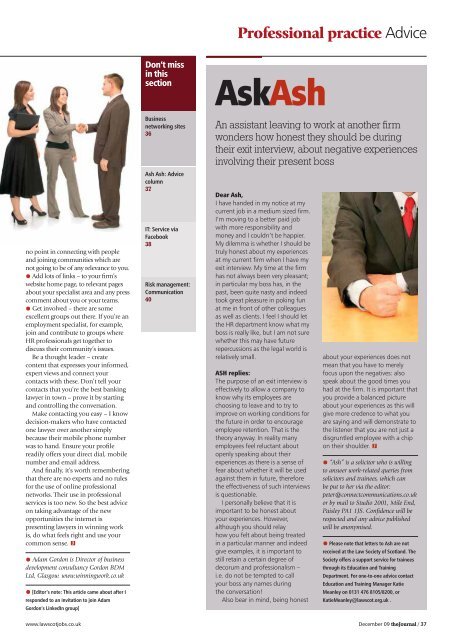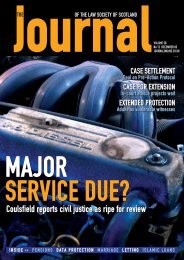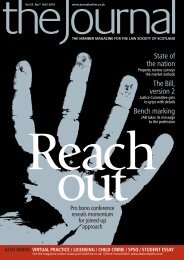Professional briefing - The Journal Online
Professional briefing - The Journal Online
Professional briefing - The Journal Online
You also want an ePaper? Increase the reach of your titles
YUMPU automatically turns print PDFs into web optimized ePapers that Google loves.
no point in connecting with people<br />
and joining communities which are<br />
not going to be of any relevance to you.<br />
Add lots of links – to your firm’s<br />
website home page, to relevant pages<br />
about your specialist area and any press<br />
comment about you or your teams.<br />
Get involved – there are some<br />
excellent groups out there. If you’re an<br />
employment specialist, for example,<br />
join and contribute to groups where<br />
HR professionals get together to<br />
discuss their community’s issues.<br />
Be a thought leader – create<br />
content that expresses your informed,<br />
expert views and connect your<br />
contacts with these. Don’t tell your<br />
contacts that you’re the best banking<br />
lawyer in town – prove it by starting<br />
and controlling the conversation.<br />
Make contacting you easy – I know<br />
decision-makers who have contacted<br />
one lawyer over another simply<br />
because their mobile phone number<br />
was to hand. Ensure your profile<br />
readily offers your direct dial, mobile<br />
number and email address.<br />
And finally, it’s worth remembering<br />
that there are no experts and no rules<br />
for the use of online professional<br />
networks. <strong>The</strong>ir use in professional<br />
services is too new. So the best advice<br />
on taking advantage of the new<br />
opportunities the internet is<br />
presenting lawyers in winning work<br />
is, do what feels right and use your<br />
common sense.<br />
Adam Gordon is Director of business<br />
development consultancy Gordon BDM<br />
Ltd, Glasgow. www.winningwork.co.uk<br />
[Editor’s note: This article came about after I<br />
responded to an invitation to join Adam<br />
Gordon’s LinkedIn group]<br />
www.lawscotjobs.co.uk<br />
Don’t miss<br />
in this<br />
section<br />
Business<br />
networking sites<br />
36<br />
Ash Ash: Advice<br />
column<br />
37<br />
IT: Service via<br />
Facebook<br />
38<br />
Risk management:<br />
Communication<br />
40<br />
<strong>Professional</strong> practice Advice<br />
AskAsh<br />
An assistant leaving to work at another firm<br />
wonders how honest they should be during<br />
their exit interview, about negative experiences<br />
involving their present boss<br />
Dear Ash,<br />
I have handed in my notice at my<br />
current job in a medium sized firm.<br />
I’m moving to a better paid job<br />
with more responsibility and<br />
money and I couldn’t be happier.<br />
My dilemma is whether I should be<br />
truly honest about my experiences<br />
at my current firm when I have my<br />
exit interview. My time at the firm<br />
has not always been very pleasant;<br />
in particular my boss has, in the<br />
past, been quite nasty and indeed<br />
took great pleasure in poking fun<br />
at me in front of other colleagues<br />
as well as clients. I feel I should let<br />
the HR department know what my<br />
boss is really like, but I am not sure<br />
whether this may have future<br />
repercussions as the legal world is<br />
relatively small.<br />
ASH replies:<br />
<strong>The</strong> purpose of an exit interview is<br />
effectively to allow a company to<br />
know why its employees are<br />
choosing to leave and to try to<br />
improve on working conditions for<br />
the future in order to encourage<br />
employee retention. That is the<br />
theory anyway. In reality many<br />
employees feel reluctant about<br />
openly speaking about their<br />
experiences as there is a sense of<br />
fear about whether it will be used<br />
against them in future, therefore<br />
the effectiveness of such interviews<br />
is questionable.<br />
I personally believe that it is<br />
important to be honest about<br />
your experiences. However,<br />
although you should relay<br />
how you felt about being treated<br />
in a particular manner and indeed<br />
give examples, it is important to<br />
still retain a certain degree of<br />
decorum and professionalism –<br />
i.e. do not be tempted to call<br />
your boss any names during<br />
the conversation!<br />
Also bear in mind, being honest<br />
about your experiences does not<br />
mean that you have to merely<br />
focus upon the negatives: also<br />
speak about the good times you<br />
had at the firm. It is important that<br />
you provide a balanced picture<br />
about your experiences as this will<br />
give more credence to what you<br />
are saying and will demonstrate to<br />
the listener that you are not just a<br />
disgruntled employee with a chip<br />
on their shoulder.<br />
“Ash” is a solicitor who is willing<br />
to answer work-related queries from<br />
solicitors and trainees, which can<br />
be put to her via the editor:<br />
peter@connectcommunications.co.uk<br />
or by mail to Studio 2001, Mile End,<br />
Paisley PA1 1JS. Confidence will be<br />
respected and any advice published<br />
will be anonymised.<br />
Please note that letters to Ash are not<br />
received at the Law Society of Scotland. <strong>The</strong><br />
Society offers a support service for trainees<br />
through its Education and Training<br />
Department. For one-to-one advice contact<br />
Education and Training Manager Katie<br />
Meanley on 0131 476 8105/8200, or<br />
KatieMeanley@lawscot.org.uk .<br />
December 09 the<strong>Journal</strong> / 37










